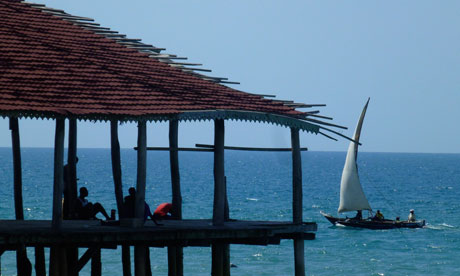
A white cat darts from behind a grave and disappears with a screech into the cemetery outside Malindi Mosque in Stone Town. "Ghosts are everywhere," says my new friend Mohamed, nervously adjusting his hat. "Zanzibar has been ruled by the Portuguese, Omanis, British – but our shetani [spirits] never lose their power."
In the humid darkness an hour after sunset, Mohamed and his assistant Rama are taking me through the tangled alleyways of Stone Town in search of ghosts. Earlier that evening I'd watched the sun set from the balcony bar of Africa House Hotel while drinking cocktails called dawas, which means "magic potions" in Swahili. Now it is time for some real island magic.
We pass a giant banyan tree where, apparently, ghouls enjoy lurking on summer evenings, and the shop of a herbalist who can help clean your soul of uninvited guests.
I certainly didn't expect to spend my time here hunting spirits. Around 50km off the coast of mainland Tanzania, the cluster of islands that make up the Zanzibar archipelago are best known for spices, coral reefs and their fringes of dreamlike beaches. Escaping the bleak English winter, I spent my first two days sipping Tusker beer in a hammock on the north-east coast, idly watching local women collecting tendrils of seaweed from the ocean. At our colourful guesthouse, called Matemwe Beach, the pool and living areas give directly onto sand so fine your feet sink inches into it with every step. A short boat ride from my hammock was the Mnemba Atoll, perhaps Zanzibar's best diving spot, so I occasionally hauled myself off the hot sand to watch lionfish, eels and turtles meandering over the reef.
It was only when we drove down to explore a fishing village called Kizimkazi, at the southern tip of the island, that the dark side of paradise began to reveal itself. We stayed at Unguja Lodge, a series of thatched villas where monkeys hang out in the outdoor showers, playfully stealing soap or sunglasses and dragging them off into the jungle. The rooms look out on to dramatic rocky beaches that sit gapingly empty apart from fishermen and the occasional boat heading out to look for dolphins. At night the cry of bushbabies floated eerily in through wooden shutters.
Underneath the holiday-brochure beaches, ancient ghosts are said to haunt a network of coastline caves in Kizimkazi, and witch doctors use the rocks to commune with spirits. I went with a local guide to visit the Ngonga Caves and met a witch doctor with a rapper's handshake and a toothy grin who sat me down in his mud hut "office" to make me a love amulet. "You must find love," he said, pressing the amulet into my hands along with a bag of sticky mangos. "And you must eat more."
He took me down a wooden ladder into the mouth of a cave, explaining how women come to him to curse their husbands' mistresses. The caves smelled of wet leaves and incense, with knobbly tree roots tumbling down from circular rock-openings in the ceiling. They go on for miles, he said, crammed with ghosts, but even the cave shetani of Kizimkazi can't compare with the quantity of spirits lurking in the alleyways of Stone Town.
Which is why the climax of my visit to Zanzibar is spent holding my breath in a seaside graveyard, looking for ghosts. As the white cat hisses behind a grave, I can see why three out of the five guides trained to work on this tour are too scared to go through with it. Seventy-four higgledy-piggledy graveyards are scattered around and underneath Stone Town, ranging in splendour from street-corner graves to the walled gardens attached to the Palace Museum, where many of Zanzibar's sultans are buried. The Portuguese had a trading post in Stone Town as early as 1503 and Omani Arabs completed the town's fort in 1701, but the disorientating coral stone maze of alleys and houses mostly date from the height of Zanzibar's commercial power as a centre for spice and slave trading in the 19th century.
Many of the cemeteries, such as the area outside Malindi Mosque where our spirit chasing began, were built over as the town grew.
"Graveyards are the homes of ghosties," says Rama. "When houses are built on top of these graves, the ghosties must move into the houses."
Obviously. Mohamed describes how during the revolution of 1964, four weeks after Zanzibar gained independence from the British, a Ugandan migrant labourer named John Okello led a bloody uprising against the country's wealthy and politically powerful Arabs. Arabs and Indians were massacred and many of the country's non-African inhabitants, including Zanzibar's last sultan, Jamshid bin Abdullah, fled the country. The dusty courtyards and corridors of Arab homes were abandoned, but vengeful spirits remained.
As we exit onto the seafront, it's a relief to see the white sand and groups of women watching the football, all wearing the colourful local dresses, kangas, with proverbs on their hems. "A sugarcane is sweetest at the joint," one reads ("Tamu ya mua kifundo"), meaning that fruits of hard labour are enjoyed the most.
Rama tells me never to articulate a lack of belief in the streets of Stone Town, since the shetani enjoy taunting non-believers. As we wind our way back to my hotel, passing tall crumbled walls and the smell of lemongrass, I decide with a shiver that tomorrow I will bury my Kizimkazi love amulet in the sand before heading to the airport. "If a ghostie comes to visit tonight, remember they are scared of you as well," Rama says helpfully, waving goodbye.
The Art of Leaving by Anna Stothard is out in March (Alma Books, £7.99). Anna travelled as a guest of Rainbow Tours (rainbowtours.co.uk), which offers a six-night holiday to Zanzibar from £1,595pp, based on two sharing and including return flights with Kenya Airways from London to Zanzibar, and road transfers

